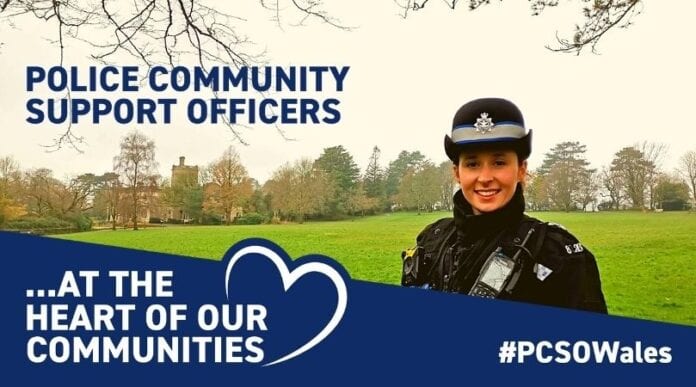They are the familiar faces dressed in the black and blue uniform, and the reassuring visible presence of the Police in communities right across Wales since 2003. This week we’ll be introducing you to some of them, and giving an insight into the various work they undertake at the heart of our communities to make them safer and better places to live, work and visit.
In Dyfed-Powys Police alone, and the same will be true of the other forces, PCSOs have received commendations from the Chief Constable for a range of activity including: community engagement, dealing with suicide attempts, detaining suspects, and giving life-saving aid to name but a few. They are also recognised in the Force’s Annual Awards for their inspirational behaviour, courage and compassion. In last year’s awards, 14 PCSOs won in various categories: the Bravery Award, Problem Solving Award, Team of the Year, and the publicly voted #WeCare award.
They defuse the fear of crime, keep people safe from harm and increase community trust and confidence by working with the local community to tackle issues of local concern.
PCSO’s are crucial to the success of our approach to neighbourhood policing and are a vital link between local communities and police. It is a career that plays a pivotal role in and can really make a difference in those communities – and to the most vulnerable.
This has been evident in the important part they’ve played during the Coronavirus health crisis. They have provided constant positive engagement with communities, using problem orientated policing plans to address issues and assist with controlling the stay at home/ non-essential travel phases of the pandemic. Community concerns have also been addressed by carrying out targeted joint patrols with partner agencies. The Welsh forces also provided PCSOs with the enhanced powers to enforce regulations and issue fixed penalty notices in exceptional circumstances.
It is different to being a warranted Police Officer, as they do not have the power of arrest, but they can detain people where necessary, and have designated powers surrounding anti-social behaviour, tobacco and alcohol, and fixed penalty notices for example. The role supports police officers in a wide range of scenarios and they have taken on a number of enhanced, specialist roles in forces such as problem solving and cybercrime.
The Deputy Minister and Chief Whip, Jane Hutt, added: “The Welsh Government has provided funding for Police Community Support Officers across Wales since 2011, and in the recent budget we confirmed our commitment for 2021-22.
“PCSOs provide a visible police presence at a local level, reassuring the public, understanding local needs, bridging the gap between communities and police forces, and helping to build a safer, more inclusive Wales.
“They have made a huge difference right across Wales throughout the Covid-19 pandemic response by helping to tackle local concerns and supporting the most vulnerable people in our communities. I want to applaud and celebrate the work they have done.”
Commissioner Alun Michael, Wales Lead for Police & Crime Commissioners on PCSOs, added: “The PCSO role is enormously valued by communities in every part of Wales and is vital in the way the four police forces in Wales have maintained neighbourhood policing through a period when Austerity led to some Forces in England stepping away from a part of policing that we regard as essential.
“It’s a valued role in its own right – whereas warranted police officers often have to be deployed to meet challenges, events and incidents that are often immediate and significant the whole point of PCSOs is to be there in the community all the time – and it works. Their role is threefold: communication by speaking to our communities and listening to what the public say, problem solving by working through the everyday issues that worry the community, and empowering the community by helping local people to improve the quality of life locally.
“Support from Welsh Government means that we have double the number of PCSOs to Forces in England and that strengthens the whole policing team in their role of helping our communities to be strong, safe and confident. And the individual stories of work done by our PCSOs is truly inspirational – complementing the superb work of our officers and the rest of our police staff in Wales.”
Policing Lead for Community Support Officers across Wales, T/Chief Constable Claire Parmenter said: “PCSOs play such a vital role in our communities, I know how valued they are and the fantastic work they do to prevent crime and reassure our communities across Wales. The four Welsh forces are supported by Welsh Government who fund a proportion of the PCSOs across Wales.
“This assists in maintaining this important resource at a time when Police forces have many competing funding demands. We really value and respect their work and recognise their dedication and commitment as we all work together to reduce harm and crime in Wales. I’m looking forward to hearing the stories of some of our dedicated and professional PCSOs this week – people may be surprised at the breadth and variety of their work and the significant impact they are having on communities.”
First up – introducing two PCSOs from Dyfed-Powys Police, PCSO Josh Chapman and PCSO Lowri Evans.
Meet our PCSOs
PCSO Josh Chapman

Josh is a Police Community Engagement Officer within the Neighbourhood Policing Team in Llanelli Rural. This specialist role was created a year ago after Dyfed Powys Police conducted a review of the Neighbourhood Policing Teams structures.
Josh said: “The thing I enjoy most about this job, is the fact you never know what you’re going to be dealing with. Each day and each incident we deal with is different. I also enjoy building good working relationships and trust with the most vulnerable members of the community I serve, who I feel wouldn’t have a voice without us.”
In his role he thinks about how to use his engagement skills on a daily basis to reach his intended audience in the most effective and beneficial way for them. And since the pandemic they’ve had to do things a little differently.
For Hate Crime Awareness week, Josh decided to produce a video targeted at their Llanelli Rural community via the team Twitter account. The account had over a 1000 local followers, and videos had previously been successful to share information and raise awareness, as followers would retweet and engage with them.
He got the rest of his team involved to deliver the important message of saying no to hate crime and working together to make the community more inclusive and safe, as he knew that most of them were familiar and friendly faces to the audience, which would encourage interest and views. But he also recognised the diversity in his community and their language requirements – so in order to reach as many as possible he used Welsh, English, Polish and British Sign Language in the video.
This would encourage them to be able to report hate crime and incidents with confidence to the team, safe in the knowledge they could do so in the way they’re most comfortable in communicating. The video got around 2,000 views through followers sharing the content – but importantly it started a conversation in the community around this difficult, hurtful and frightening issue, and made them aware that reporting makes a difference – to them, their friends, and their lives.
Having a number of deaf people on his patch, Josh was delighted to have successfully completed the Level 1 British Sign Language qualification in just 12 days, and is currently eagerly working on completing the Level 2 qualification.
Reflecting, he said: “Whilst working at Llwynhendy Police Station one day, I was made aware that a deaf family were at the station. They needed to speak to a PCSO to report criminal offences, but also wanted advice in relation to COVID. I was very pleased to have been able to use my British Sign Language skills to make them feel comfortable, whilst conversing with them to obtain the information and provide advice.
“It’s really important to me that the deaf community are given the same opportunity as the rest of our community in terms of ease of contacting police. In order to maintain my confidence and build on my BSL skills, I’ve since had many conversations with deaf members of the community in Llanelli rural areas, and am always seeking to further build the bond between the deaf community and the police on my patch. I’m looking forward to attending the Llanelli Deaf Club when Covid restrictions allow.”
One of his proudest moments since being a PCSO was representing the force in the National Police Lifesaving Championships in June 2019.
“The essential first aid skills I’d acquired as part of my role were put to the test as part of the mixed team for Dyfed Powys Police at the Championships. The standard was extremely high across all teams in the event, so I was really proud to leave the event with a Gold medal and trophy for the mixed team, and win Silver in the men’s individual events. It’s reassuring as I never know when I’ll need to put these life-saving skills into practice in this job.”
PCSO Lowri Evans

Lowri is a member of the Llanelli Neighbourhood Policing Team (NPT). She has worked for Dyfed-Powys Police for five years – but was a call handler in the Force Communication Centre for the first two years, and has been a PCSO in Llanelli for the past three years.
“I love being a PCSO – as clichéd as it sounds it gives me the opportunity to really help people in the community I serve,” Lowri said.
“Every day is different and challenging – from reassuring the public by being out on high visibility patrols, to sign posting and referring members of the public to other agencies best placed to help them, and doing all I can to support vulnerable people within the community. I enjoy the flexibility to think ‘outside the box’ to find the best solution for all those concerned.”
During the Coronovirus pandemic, she has been proactive in playing her part to help protect the NHS and save lives on her patch. She volunteered to conduct additional joint patrols with partners from licensing and trading standards. Covid regulations have been dynamic and sometimes led to confusion – but Lowri fully embraced the engage, explain, and encourage approach to address this.
During the Firebreak Lockdown, she coordinated and led a check point operation on vehicles entering Llanelli. More than 200 people were stopped, and 13 vehicles were directed home. She also identified an Anti-Social Behaviour hotspot in the town and deployed the Mobile Police Station there to increase visibility and address community concerns – as a result six people were directed to go home.
But by far, her proudest achievement has been getting a vulnerable man who could have fallen under the radar, the full time support he needed during the pandemic. Lowri had noticed an increase in 999 calls from the man on a nearly daily basis, and over a few months there were more than 100 calls of a similar nature.
Lowri added: “This man came to my attention after I noticed a concerning increase in 999 calls from him around the start of the pandemic. After initially approaching him to better understand what was going on, I then worked with one of my PCSO colleagues with him intensely for nearly a year.
“We found that a lot of partner agencies were working from home more due to the pandemic and lockdowns, and therefore it was difficult to provide him with the support he needed. We worked with him at least once a week, attending his home following calls, referring him to the most appropriate agencies, supporting him by organising and delivering a food parcel from the foodbank, providing him with basics such as cutlery, organising clothing for him and ensuring he was not going to become a victim of mate crime due to his vulnerability.
“It was important we advocated for him, and always raised our observations and concerns with partner agencies and support services. Often individuals are required to self-refer and be willing to seek support in order to access it from support services, but this person was isolated and unable to identify his own vulnerability. The pandemic obviously made the situation more difficult too due to reduced face-to-face visits. But eventually our efforts paid off, and we secured the appropriate full time support he needed.”
When Lowri puts the uniform on for a shift, she’s proud to walk the beat and be the visible presence of the force to reassure the community. She’s passionate about fostering a relationship and trust with them, to identify any emerging problems and concerns that need to be addressed. She sees working closely with partners to take a problem solving approach to long standing incidents, referring members of the public to the most appropriate agencies for support, and also reducing Anti-Social behaviour as priorities, in order to improve the lives of those in her community.

Help keep news FREE for our readers
Supporting your local community newspaper/online news outlet is crucial now more than ever. If you believe in independent journalism, then consider making a valuable contribution by making a one-time or monthly donation. We operate in rural areas where providing unbiased news can be challenging. Read More About Supporting The West Wales Chronicle

























